Unit 4 My Neighbourhood.学案(共6课时,无答案)
文档属性
| 名称 | Unit 4 My Neighbourhood.学案(共6课时,无答案) |
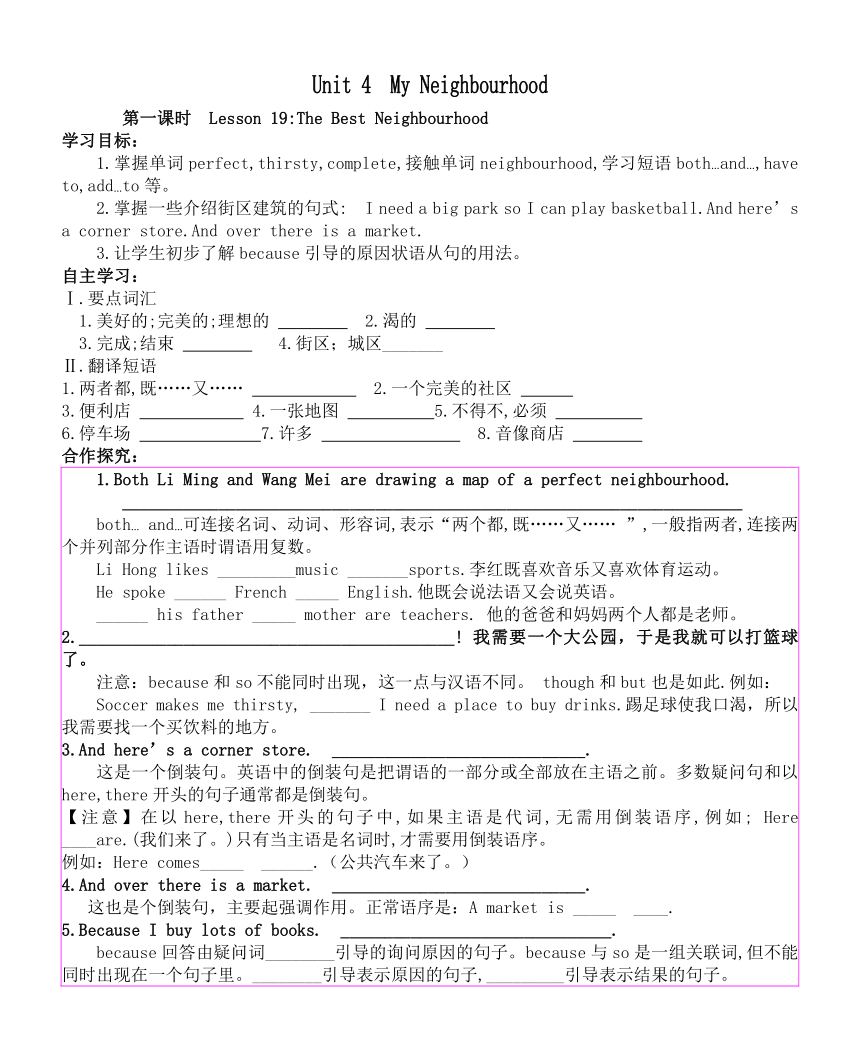
|
|
| 格式 | zip | ||
| 文件大小 | 137.8KB | ||
| 资源类型 | 教案 | ||
| 版本资源 | 冀教版 | ||
| 科目 | 英语 | ||
| 更新时间 | 2017-10-16 00:00:00 | ||
图片预览

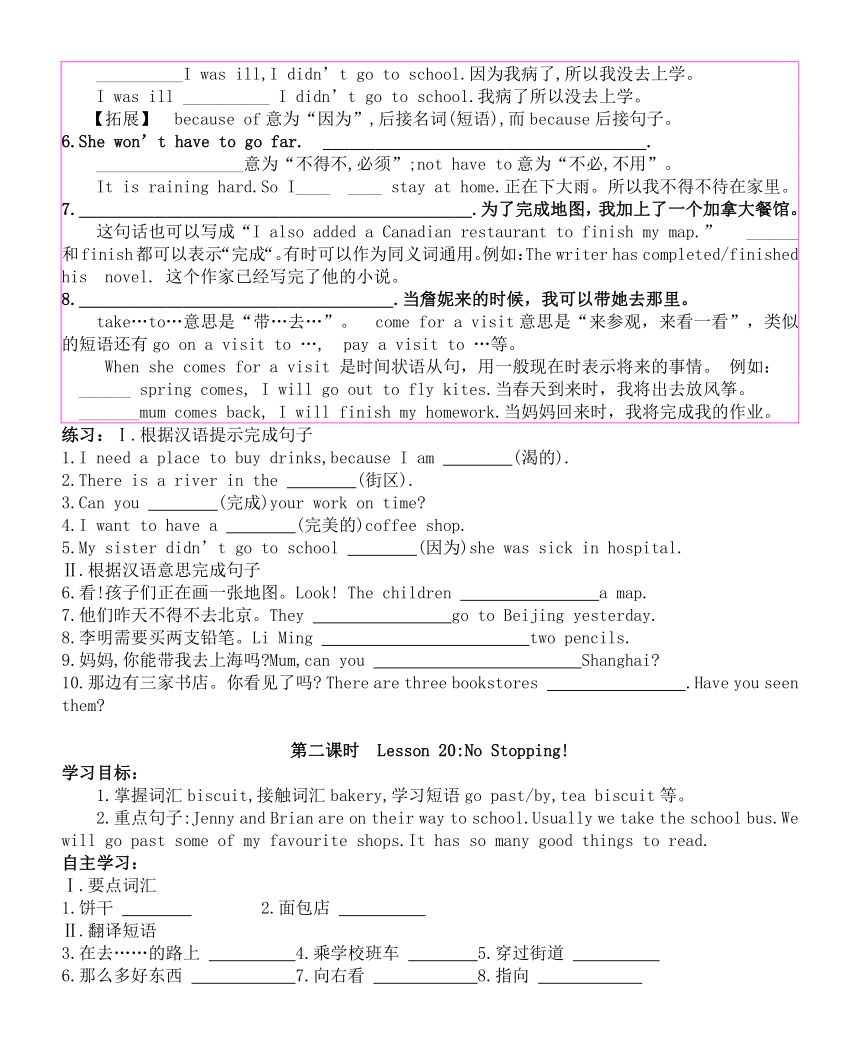
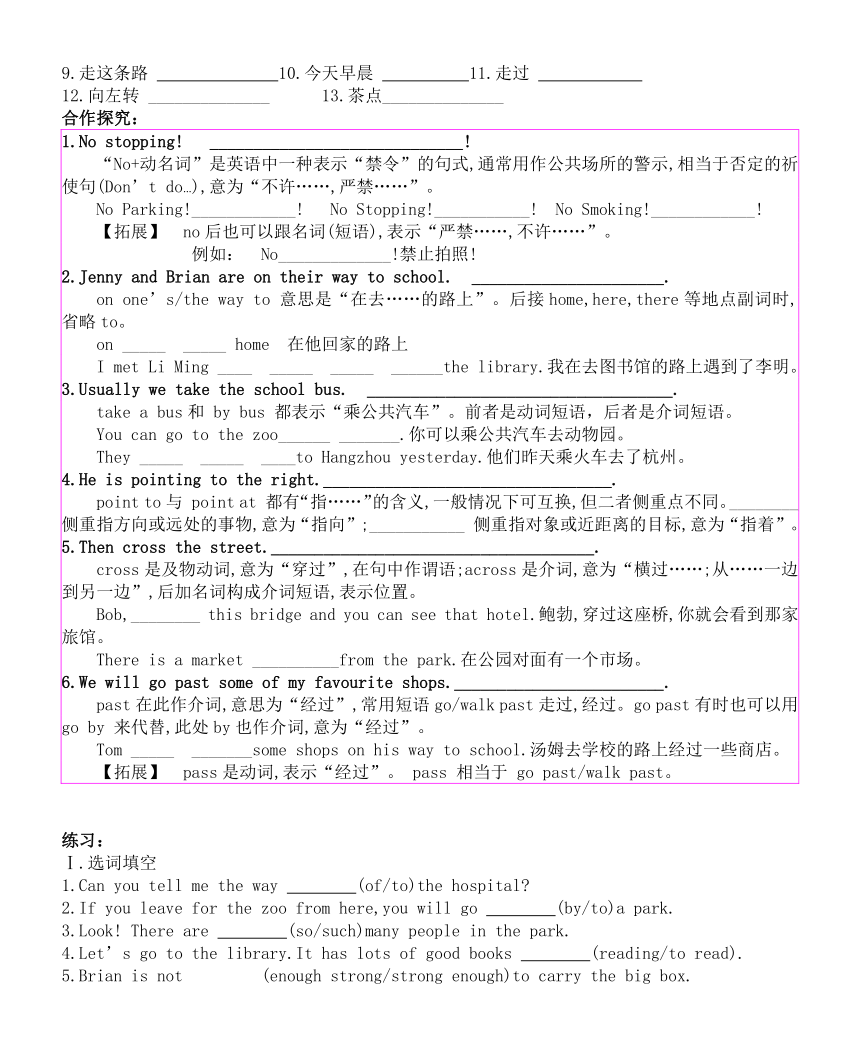
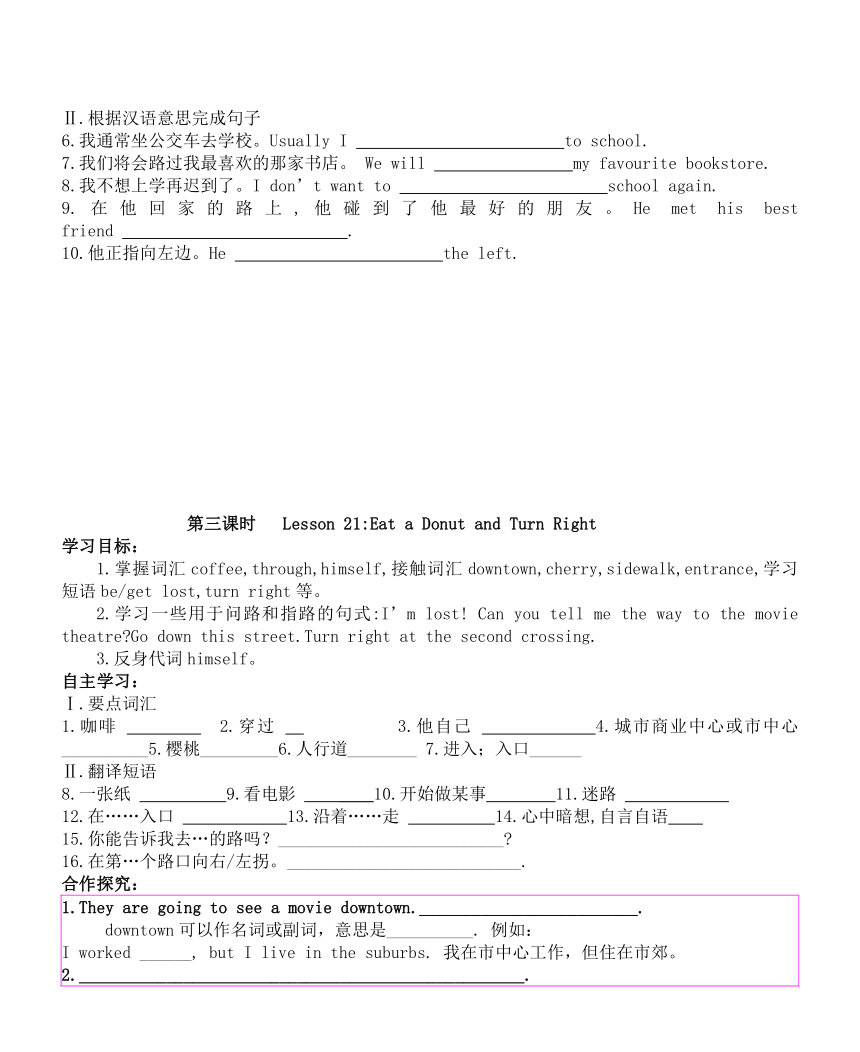
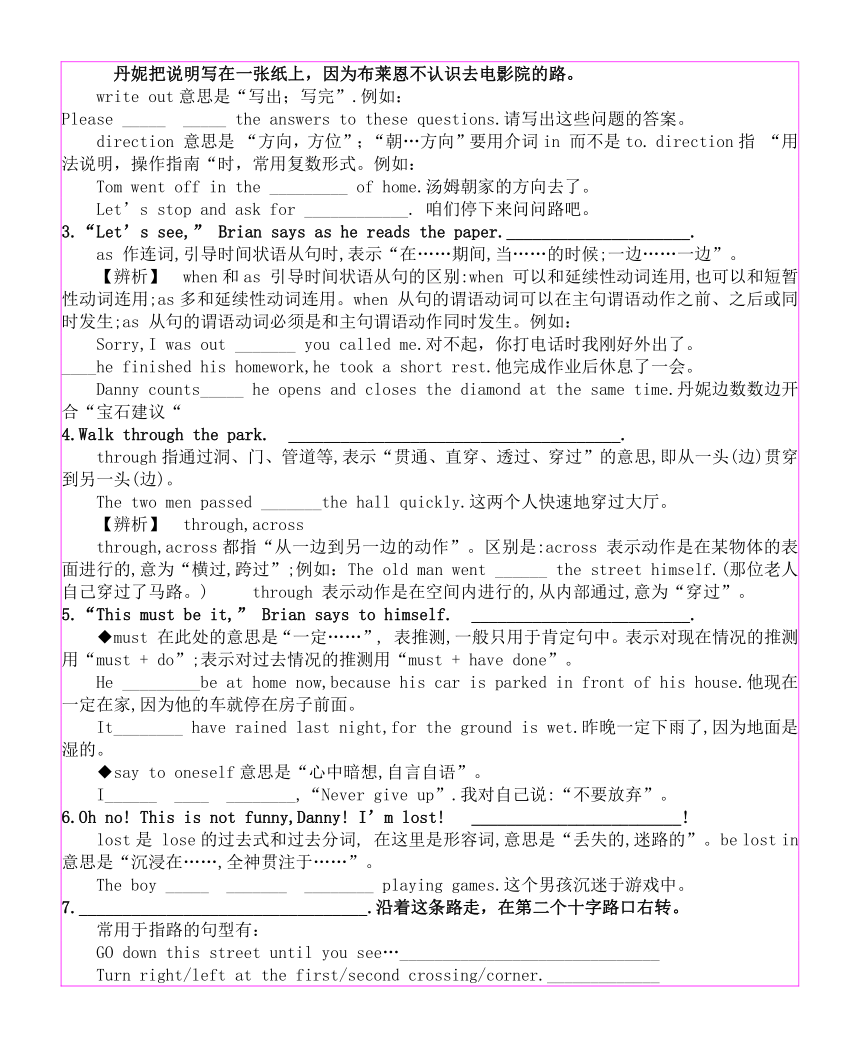
文档简介
Unit
4 My
Neighbourhood
第一课时 Lesson
19:The
Best
Neighbourhood
学习目标:
1.掌握单词perfect,thirsty,complete,接触单词neighbourhood,学习短语both…and…,have
to,add…to等。
2.掌握一些介绍街区建筑的句式: I
need
a
big
park
so
I
can
play
basketball.And
here’s
a
corner
store.And
over
there
is
a
market.
3.让学生初步了解because引导的原因状语从句的用法。
自主学习:
Ⅰ.要点词汇
1.美好的;完美的;理想的
2.渴的
3.完成;结束
4.街区;城区_______
Ⅱ.翻译短语
1.两者都,既……又……
2.一个完美的社区
3.便利店
4.一张地图
5.不得不,必须
6.停车场
7.许多
8.音像商店
合作探究:
1.Both
Li
Ming
and
Wang
Mei
are
drawing
a
map
of
a
perfect
neighbourhood.
_______________________________________________________________________
both…
and…可连接名词、动词、形容词,表示“两个都,既……又……
”,一般指两者,连接两个并列部分作主语时谓语用复数。
Li
Hong
likes
_________music
_______sports.李红既喜欢音乐又喜欢体育运动。
He
spoke
______
French
_____
English.他既会说法语又会说英语。
______
his
father
_____
mother
are
teachers.
他的爸爸和妈妈两个人都是老师。
2.___________________________________________!
我需要一个大公园,于是我就可以打篮球了。
注意:because和so不能同时出现,这一点与汉语不同。
though和but也是如此.例如:
Soccer
makes
me
thirsty,
_______
I
need
a
place
to
buy
drinks.踢足球使我口渴,所以我需要找一个买饮料的地方。
3.And
here’s
a
corner
store. _____________________________.
这是一个倒装句。英语中的倒装句是把谓语的一部分或全部放在主语之前。多数疑问句和以here,there开头的句子通常都是倒装句。
【注意】在以here,there开头的句子中,如果主语是代词,无需用倒装语序,例如;
Here
____are.(我们来了。)只有当主语是名词时,才需要用倒装语序。
例如:Here
comes_____
______.(公共汽车来了。)
4.And
over
there
is
a
market.
_____________________________.
这也是个倒装句,主要起强调作用。正常语序是:A
market
is
_____
____.
5.Because
I
buy
lots
of
books. _______________________________.
because回答由疑问词________引导的询问原因的句子。because与so是一组关联词,但不能同时出现在一个句子里。________引导表示原因的句子,_________引导表示结果的句子。
__________I
was
ill,I
didn’t
go
to
school.因为我病了,所以我没去上学。
I
was
ill
__________
I
didn’t
go
to
school.我病了所以没去上学。
【拓展】 because
of意为“因为”,后接名词(短语),而because后接句子。
6.She
won’t
have
to
go
far. _____________________________________.
_________________意为“不得不,必须”;not
have
to意为“不必,不用”。
It
is
raining
hard.So
I____
____
stay
at
home.正在下大雨。所以我不得不待在家里。
7._____________________________________________.为了完成地图,我加上了一个加拿大餐馆。
这句话也可以写成“I
also
added
a
Canadian
restaurant
to
finish
my
map.”
______和finish都可以表示“完成“。有时可以作为同义词通用。例如:The
writer
has
completed/finished
his
novel.
这个作家已经写完了他的小说。
8.____________________________________.当詹妮来的时候,我可以带她去那里。
take…to…意思是“带…去…”。
come
for
a
visit意思是“来参观,来看一看”,类似的短语还有go
on
a
visit
to
…,
pay
a
visit
to
…等。
When
she
comes
for
a
visit
是时间状语从句,用一般现在时表示将来的事情。
例如:
______
spring
comes,
I
will
go
out
to
fly
kites.当春天到来时,我将出去放风筝。
_______mum
comes
back,
I
will
finish
my
homework.当妈妈回来时,我将完成我的作业。
练习:Ⅰ.根据汉语提示完成句子
1.I
need
a
place
to
buy
drinks,because
I
am
(渴的).
2.There
is
a
river
in
the
(街区).
3.Can
you
(完成)your
work
on
time
4.I
want
to
have
a
(完美的)coffee
shop.
5.My
sister
didn’t
go
to
school
(因为)she
was
sick
in
hospital.
Ⅱ.根据汉语意思完成句子
6.看!孩子们正在画一张地图。Look!
The
children
a
map.
7.他们昨天不得不去北京。They
go
to
Beijing
yesterday.
8.李明需要买两支铅笔。Li
Ming
two
pencils.
9.妈妈,你能带我去上海吗 Mum,can
you
Shanghai
10.那边有三家书店。你看见了吗
There
are
three
bookstores
.Have
you
seen
them
第二课时 Lesson
20:No
Stopping!
学习目标:
1.掌握词汇biscuit,接触词汇bakery,学习短语go
past/by,tea
biscuit等。
2.重点句子:Jenny
and
Brian
are
on
their
way
to
school.Usually
we
take
the
school
bus.We
will
go
past
some
of
my
favourite
shops.It
has
so
many
good
things
to
read.
自主学习:
Ⅰ.要点词汇
1.饼干
2.面包店
Ⅱ.翻译短语
3.在去……的路上
4.乘学校班车
5.穿过街道
6.那么多好东西
7.向右看
8.指向
9.走这条路
10.今天早晨
11.走过
12.向左转
______________ 13.茶点______________
合作探究:
1.No
stopping!
_____________________________!
“No+动名词”是英语中一种表示“禁令”的句式,通常用作公共场所的警示,相当于否定的祈使句(Don’t
do…),意为“不许……,严禁……”。
No
Parking!____________!
No
Stopping!___________!
No
Smoking!____________!
【拓展】 no后也可以跟名词(短语),表示“严禁……,不许……”。
例如:
No_____________!禁止拍照!
2.Jenny
and
Brian
are
on
their
way
to
school. ______________________.
on
one’s/the
way
to
意思是“在去……的路上”。后接home,here,there等地点副词时,省略to。
on
_____
_____
home 在他回家的路上
I
met
Li
Ming
____
_____
_____
______the
library.我在去图书馆的路上遇到了李明。
3.Usually
we
take
the
school
bus. ___________________________________.
take
a
bus和
by
bus
都表示“乘公共汽车”。前者是动词短语,后者是介词短语。
You
can
go
to
the
zoo______
_______.你可以乘公共汽车去动物园。
They
_____
_____
____to
Hangzhou
yesterday.他们昨天乘火车去了杭州。
4.He
is
pointing
to
the
right._________________________________.
point
to与
point
at
都有“指……”的含义,一般情况下可互换,但二者侧重点不同。________侧重指方向或远处的事物,意为“指向”;___________
侧重指对象或近距离的目标,意为“指着”。
5.Then
cross
the
street._____________________________________.
cross是及物动词,意为“穿过”,在句中作谓语;across是介词,意为“横过……;从……一边到另一边”,后加名词构成介词短语,表示位置。
Bob,________
this
bridge
and
you
can
see
that
hotel.鲍勃,穿过这座桥,你就会看到那家旅馆。
There
is
a
market
__________from
the
park.在公园对面有一个市场。
6.We
will
go
past
some
of
my
favourite
shops.________________________.
past在此作介词,意思为“经过”,常用短语go/walk
past走过,经过。go
past有时也可以用go
by
来代替,此处by也作介词,意为“经过”。
Tom
_____
_______some
shops
on
his
way
to
school.汤姆去学校的路上经过一些商店。
【拓展】 pass是动词,表示“经过”。
pass
相当于
go
past/walk
past。
练习:
Ⅰ.选词填空
1.Can
you
tell
me
the
way
(of/to)the
hospital
2.If
you
leave
for
the
zoo
from
here,you
will
go
(by/to)a
park.
3.Look!
There
are
(so/such)many
people
in
the
park.
4.Let’s
go
to
the
library.It
has
lots
of
good
books
(reading/to
read).
5.Brian
is
not
(enough
strong/strong
enough)to
carry
the
big
box.
Ⅱ.根据汉语意思完成句子
6.我通常坐公交车去学校。Usually
I
to
school.
7.我们将会路过我最喜欢的那家书店。
We
will
my
favourite
bookstore.
8.我不想上学再迟到了。I
don’t
want
to
school
again.
9.在他回家的路上,他碰到了他最好的朋友。He
met
his
best
friend
.
10.他正指向左边。He
the
left.
第三课时
Lesson
21:Eat
a
Donut
and
Turn
Right
学习目标:
1.掌握词汇coffee,through,himself,接触词汇downtown,cherry,sidewalk,entrance,学习短语be/get
lost,turn
right等。
2.学习一些用于问路和指路的句式:I’m
lost!
Can
you
tell
me
the
way
to
the
movie
theatre Go
down
this
street.Turn
right
at
the
second
crossing.
3.反身代词himself。
自主学习:
Ⅰ.要点词汇
1.咖啡
2.穿过
3.他自己
4.城市商业中心或市中心__________5.樱桃_________6.人行道________
7.进入;入口______
Ⅱ.翻译短语
8.一张纸
9.看电影
____10.开始做某事 11.迷路
12.在……入口
13.沿着……走
14.心中暗想,自言自语
15.你能告诉我去…的路吗?__________________________
16.在第…个路口向右/左拐。___________________________.
合作探究:
1.They
are
going
to
see
a
movie
downtown._________________________.
downtown可以作名词或副词,意思是__________.
例如:
I
worked
______,
but
I
live
in
the
suburbs.
我在市中心工作,但住在市郊。
2.___________________________________________________.
丹妮把说明写在一张纸上,因为布莱恩不认识去电影院的路。
write
out意思是“写出;写完”.例如:
Please
_____
_____
the
answers
to
these
questions.请写出这些问题的答案。
direction
意思是
“方向,方位”;“朝…方向”要用介词in
而不是to.
direction指
“用法说明,操作指南“时,常用复数形式。例如:
Tom
went
off
in
the
_________
of
home.汤姆朝家的方向去了。
Let’s
stop
and
ask
for
____________.
咱们停下来问问路吧。
3.“Let’s
see,”
Brian
says
as
he
reads
the
paper._____________________.
as
作连词,引导时间状语从句时,表示“在……期间,当……的时候;一边……一边”。
【辨析】 when和as
引导时间状语从句的区别:when
可以和延续性动词连用,也可以和短暂性动词连用;as多和延续性动词连用。when
从句的谓语动词可以在主句谓语动作之前、之后或同时发生;as
从句的谓语动词必须是和主句谓语动作同时发生。例如:
Sorry,I
was
out
_______
you
called
me.对不起,你打电话时我刚好外出了。
____he
finished
his
homework,he
took
a
short
rest.他完成作业后休息了一会。
Danny
counts_____
he
opens
and
closes
the
diamond
at
the
same
time.丹妮边数数边开合“宝石建议“
4.Walk
through
the
park. ______________________________________.
through指通过洞、门、管道等,表示“贯通、直穿、透过、穿过”的意思,即从一头(边)贯穿到另一头(边)。
The
two
men
passed
_______the
hall
quickly.这两个人快速地穿过大厅。
【辨析】 through,across
through,across都指“从一边到另一边的动作”。区别是:across
表示动作是在某物体的表面进行的,意为“横过,跨过”;例如:The
old
man
went
______
the
street
himself.(那位老人自己穿过了马路。)
through
表示动作是在空间内进行的,从内部通过,意为“穿过”。
5.“This
must
be
it,”
Brian
says
to
himself. _________________________.
◆must
在此处的意思是“一定……”,
表推测,一般只用于肯定句中。表示对现在情况的推测用“must
+
do”;表示对过去情况的推测用“must
+
have
done”。
He
_________be
at
home
now,because
his
car
is
parked
in
front
of
his
house.他现在一定在家,因为他的车就停在房子前面。
It________
have
rained
last
night,for
the
ground
is
wet.昨晚一定下雨了,因为地面是湿的。
◆say
to
oneself意思是“心中暗想,自言自语”。
I______
____
________,“Never
give
up”.我对自己说:“不要放弃”。
6.Oh
no!
This
is
not
funny,Danny!
I’m
lost!
________________________!
lost是
lose的过去式和过去分词,
在这里是形容词,意思是“丢失的,迷路的”。be
lost
in
意思是“沉浸在……,全神贯注于……”。
The
boy
_____
_______
________
playing
games.这个男孩沉迷于游戏中。
7._________________________________.沿着这条路走,在第二个十字路口右转。
常用于指路的句型有:
GO
down
this
street
until
you
see…______________________________
Turn
right/left
at
the
first/second
crossing/corner._____________
It’s
about
…
metres/kilometres
from
here.____________________
You
can
take
a
bus/taxi/train…_________________________________
练习:Ⅰ.根据句意及首字母提示补全单词
1.Mike
learns
French
by
h
because
no
one
can
understand
French.
2.The
s
day
of
a
week
is
Monday.
3.I
am
l .Can
you
tell
me
the
way
to
the
hospital
4.The
travelers
walked
t
the
forest(森林)and
came
back
home.
Ⅱ.根据汉语提示完成句子
5.Go
(市中心)and
you
will
find
the
school.
6.They
are
going
to
(
看电影)downtown.
7.
(沿着……走)the
road,and
you
will
see
a
shop.
8. (穿过)the
park
and
(向右拐).
9. (打扰了).Can
you
tell
me
the
way
to
the
post
office
10.The
bookstore
will
(正前方).
11.Turn
left
at
the
(第二个十字路口).
12.
(三分钟后),they
got
to
the
factory.
第四课时 Lesson
22:I
Like
My
Neighbourhood
学习目标:
1.掌握词汇block,bank,whole,cost,接触词汇pond,freeze,hockey,chat,学习句型It’s…blocks
(away)from…等。
2.学习一些用于介绍街区情况的句式:There
is
a
pond
near
my
house.There’s
also
a
new
shopping
centre
in
my
neighbourhood.It
has
a
coffee
shop,a
grocery
store,a
bank
and
a
movie
theatre.等。
3.用There
be句型谈论自己的街区里都有什么。
自主学习:
Ⅰ.要点词汇
1.街道;栋,幢
2.银行
3.整个的;完全的
4.花费
5.迈克尔_________6.池塘_______7.冰球;曲棍球_____
8.闲聊;闲谈;聊天_______
9.冻死;冻僵;结冰__________
(过去式__________
过去分词___________
)
Ⅱ.翻译短语
10.打曲棍球________11整个下午________12.购物中心_______
13.和我的朋友聊天__________14.在周末_______15.有点贵___
16.做一些家务________17.热巧克力________18.放学_______19.冬天期间
合作探究:
1.There
is
a
pond
near
my
house. _________________________________.
There
be…意思是“有……”,在这个句型中,There是引导词,句子的主语是
be动词后面的名词(短语),be
动词的单、复数取决于离它最近的名词(短语)的单复数。
________
_________three
elephants
in
the
zoo.动物园里有三头大象。
2.During
the
winter
it
freezes,
and
I
can
play
hockey
on
it
with
my
friends.
________________________________________________________________.
______意思是“结冰,凝结”,其过去式和过去分词分别为_______和__________.
Play
+
球类/棋类时,球类和棋类前不用定冠词the,但表示演奏某种乐器时则要加the.
例如:打网球
______________
弹钢琴_____________
3.It’s
only
three
blocks
from
my
house. _____________________________.
________意思是“街区”,一般指四条街道当中的区域。
“It’s
+距离+(away)
from…”表示“某地离某地的距离有多远”,其中away可以省略。
The
library
is
two
kilometers
away
_______the
supermarket.图书馆离超市有两公里远。
4.I
like
to
go
there
on
weekends,
but
I
have
to
do
some
housework..
___________________________________________________________.
表示“在周末”时,可以用at
the
weekend,
at
weekends或__________等,指周六和周日两天。
例如:
The
office
is
closed
___________.
这个办事处周六和周日两天不开门。
5.Sometimes
I
sit
for
the
whole
afternoon
and
do
my
homework.___________.
all与whole都有“整个,全部”的含义。一般来讲,all可以修饰各类名词,且限定词要放在all之后。而whole只能修饰具有整体意义的单数名词,且限定词要放在whole之前。
all
the
students所有的学生
the
whole
class=all
the
class整个班级
all
the
time=
the
whole
time
全部时间
_____
this
afternoon=_____
whole
afternoon
整个下午
______
my
life=
______
whole
life
我的一生
6.It
costs
$3.50! _________________!
【辨析】 cost,pay,spend,take
(1)cost
作动词,意为“花费”,主语为物,通常为所买的东西,不能是人,后跟宾语,句型:“Sth.cost(s)
sb.+钱数”。
The
meal
________us
£30.那顿饭花了我们
30
英镑。
(2)pay意为“给……付款”,宾语为人或钱,不能是购买的物品,常用于“Sb.+pay(s)+钱数+for+名词(所买的物品)”或“Pay+钱数+for+sb./sth.”句型中。
(3)spend常指花费金钱或时间,主语必须是人,句式为“Sb.+spend(s)+时间/金钱+on
sth./(in)doing
sth.”。
(4)take意为“花费”时,常用于句型“It
takes/took
sb.+时间+to
do
sth.”意为“某人做某事花费多少时间”。
练习:
Ⅰ.用所给词的适当形式填空
1.The
water
on
the
ground
(freeze)last
night
because
it
was
very
cold.
2.At
the
market,Mom
bought
a
(love)rabbit
for
me.
3.There
(be)a
few
(dish)on
the
table.
4.Mike
is
a
good
hockey
(play).
5.The
factory
is
four
(block)away
from
my
school.
翻译:
1.从这里到北京有多远
from
here
to
Beijing
2.那件外衣花了她200元钱。
That
coat
200
yuan.
3.他让我给他买件衬衫。
He
a
shirt
for
him.
4.看!学生们正在打扫教室。
Look!
The
students
the
classroom.
5.在这里生活很舒适。
to
live
here.
第五课时 Lesson
23:People
in
My
Neighbourhood
学习目标:
1.掌握词汇interview,fix,sound,treat,接触词汇tailor,enjoyable,学习短语be
busy
doing…,sound
like等。
2.重点句子:Our
teacher
asked
us
to
interview
people
about
their
jobs.Mr.Green
likes
being
a
tailor.It
was
warm
inside
and
full
of
yummy
treats.
3.熟悉现在完成时的用法。
自主学习:
Ⅰ.要点词汇
1.面试;采访;访谈
2.修理;维修
3.裁缝_________
4.听起来;声音
5.美食;款待
6.令人愉快的________
Ⅱ.翻译短语
7.听起来像……
8.充满……
_____9.花店
10.忙于做某事
11.去散步
12.到7点之前
__
13.一份令人愉快的工作
14.请某人做某事
合作探究:
1.Our
teacher
asked
us
to
interview
people
about
their
jobs.
_________________________________________________________.
◆ask
sb.to
do
sth.意为“要求某人做某事”,表示“要求某人不要做某事”用ask
sb.not
to
do
sth.。
They
asked
me
not
to
wait
for
them
any
longer.他们让我不要再等他们了。
◆job是可数名词,其复数形式为jobs;
work指“工作”时是不可数名词。
◆interview作可数名词,意为“____________”,复数形式是interviews。
You
can’t
get
any
jobs
without_______.不经过面试你得不到任何工作。
He
has
an
_________next
week
for
the
manager’s
job.他下周要接受一个经理职位的面试。
interview也可以是动词。例如:
We
_________20
people
for
the
job.为这份工作,我们面试了20人。
2.He
was
busy
fixing
a
pair
of
pants,but
he
still
answered
my
questions.
__________________________________________________________________.
be
busy
doing
sth.相当于be
busy
with
sth.,表示“________________”。
All
the
farmers
______
______
___________ready
for
the
next
year.所有的农民都忙着为来年做准备。
3.It
sounded
like
an
enjoyable
job. ___________________________.
sound可以作名词,意为“声音,响声”,泛指在自然界中人所能听到的任何声音;sound作动词,意为“听起来”;sound
like
意思是“______________”。
That
__________a
good
idea.那听起来是个好主意。
4.It
was
warm
inside
and
full
of
yummy
treats. _________________.
be
full
of意为“装满……的”,其同义短语为be
filled
with,意为“被充满”,是fill
with的被动语态。fill…with…意为“用……装满……”,主语一般是人。
His
bag
_____
_____
_______books.
=His
bag
_____
_____
________books.他的书包里装满了书。
5.I
learned
a
lot
about
the
people
in
my
neighbourhood.All
of
them
were
friendly
and
the
interviews
were
enjoyable.___________________________.
◆learn
about/of
意思是“听说;了解”
We_______
______
the
news
this
morning.我们今天上午得知了这个消息。
◆________意思是“有好的”,经常用作形容词,常用短语为be
friendly
to…(对…友好)。
例如:
The
animals
____
_______
____
us.
这些动物对我们很友好。
◆enjoyable为形容词,意为“___________”,由“enjoy+-able”构成。其动词形式为enjoy,名词形式是enjoyment。
练习:
Ⅰ.根据首字母或汉语提示完成句子
1.We’ll
(款待)you
to
dinner.
2.He
was
(采访)by
a
reporter.
3.He
asked
the
(裁缝)to
make
over
his
trousers.
4.My
bike
is
broken.Can
you
help
me
f
it
5.I
didn’t
think
the
trip
was
e .It
was
full
of
unhappy
things.
Ⅱ.用方框中所给短语的适当形式填空
have
been
to have
been be
full
of away
from go
for
a
walk
6.I
often
after
dinner.
7.The
shopping
centre
is
about
500
metres
here.
8.—How
long
you
a
soldier
—For
over
ten
years.
9.Her
eyes
tears(眼泪).She
was
very
excited.
10.I
many
places,such
as
Beijing,Tianjin
and
Shanghai.
第六课时 Lesson
24:I
Need
a
Map!
学习目标:
1.掌握词汇mile,across,接触词汇flu,学习短语have
the
flu,across
from等。
2.重点句子:I’m
doing
well.I
have
to
tell
you
that
I
had
the
flu.Across
from
the
bookstore,there’s
a
beautiful
park.Thanksgiving
was
a
lot
of
fun.
3.总结because引导的原因状语从句的用法。
自主学习:
Ⅰ.要点词汇
1.横过……;从……一边到另一边
2.英里
3.流行性感冒_______
Ⅱ.翻译短语
4.患流感
5.在……对面
6.走过面包店
7.逐渐认识
8.给我指路
9
.街道尽头
10.非常有趣
11.迷路
合作探究:
1.___________________________.我一直做得很好。
do
well
in
意思是“____________”
此句用现在进行时强调“一直;一向”。
2.I
have
to
tell
you
that
I
had
the
flu. ________________________.
flu意为“流感”,是非正式用语,指流行性感冒;cold意为“伤风,感冒”,一般泛指因着凉而伤风;have
the
flu意为“________”。类似的短语还有:have
a
cold(得感冒),have
a
headache(头疼),have
a
cough(咳嗽)。
How
do
you
know
when
you______
___
______ 你如何知道你得了流感
3.This
week,I
got
to
know
my
neighbourhood.____________________.
get
to
know是瞬时性动作,意为“知道,了解,逐渐认识”,强调从不认识或不了解到认识或了解的渐进过程。在肯定句中不能和表示一段时间的状语连用;know表示“认识”,是延续性动词。
We
_____
_________each
other
for
many
years.我们认识很多年了。
When
did
you
_____
____
____Nick 你是什么时候认识尼克的 (注重过程)
4.Across
from
the
bookstore,there’s
a
beautiful
park._______________.
______________意思是“在……对面”,相当于opposite。
They
live
________
________
us.他们住在我们对面。
_______
________the
bank
is
the
post
office.邮局就在银行对面。
5.Tomorrow
I’m
going
to
buy
a
map
of
the
city
because
I
don’t
want
to
get
lost
again. ____________________________________________.
◆____________引导的是原因状语从句。
◆get
lost意思是
“迷路”,表示动作;be
lost
意思是
“迷路”,表示状态。
I
______
________in
the
forest.我在森林里迷路了。
6._________________________.感恩节很有意思。
_________意思是许多,同义词是lots
of
例如:
I
have
____
_____
_____
friends.=
I
have
lots
of
friends.
练习:
Ⅰ.用所给词的适当形式填空
1.My
mother
often
gets
(lose)in
big
cities.
2.At
the
second
(cross)you
can
turn
left.
3.Turn
right
after
you
pass
the
(five)building.
4.Danny
has
already
(write)the
way
to
the
movie
theatre.
5. (lucky),I
found
my
lost
bike.
Ⅱ.根据汉语意思完成句子
6.上周杰克去看医生,因为他患了流感。
Jack
went
to
see
a
doctor
last
week,because
he
.
7.十年前我们认识的彼此。
We
each
other
ten
years
ago.
8.公园离我家大概有两英里远。
The
park
is
about
my
house.
9.昨天在我迷路的时候,一个女孩给我指了路。
A
girl
when
I
got
lost
yesterday.
10.玩猜谜游戏是非常有意思的。
Playing
a
guessing
game
is
fun.
4 My
Neighbourhood
第一课时 Lesson
19:The
Best
Neighbourhood
学习目标:
1.掌握单词perfect,thirsty,complete,接触单词neighbourhood,学习短语both…and…,have
to,add…to等。
2.掌握一些介绍街区建筑的句式: I
need
a
big
park
so
I
can
play
basketball.And
here’s
a
corner
store.And
over
there
is
a
market.
3.让学生初步了解because引导的原因状语从句的用法。
自主学习:
Ⅰ.要点词汇
1.美好的;完美的;理想的
2.渴的
3.完成;结束
4.街区;城区_______
Ⅱ.翻译短语
1.两者都,既……又……
2.一个完美的社区
3.便利店
4.一张地图
5.不得不,必须
6.停车场
7.许多
8.音像商店
合作探究:
1.Both
Li
Ming
and
Wang
Mei
are
drawing
a
map
of
a
perfect
neighbourhood.
_______________________________________________________________________
both…
and…可连接名词、动词、形容词,表示“两个都,既……又……
”,一般指两者,连接两个并列部分作主语时谓语用复数。
Li
Hong
likes
_________music
_______sports.李红既喜欢音乐又喜欢体育运动。
He
spoke
______
French
_____
English.他既会说法语又会说英语。
______
his
father
_____
mother
are
teachers.
他的爸爸和妈妈两个人都是老师。
2.___________________________________________!
我需要一个大公园,于是我就可以打篮球了。
注意:because和so不能同时出现,这一点与汉语不同。
though和but也是如此.例如:
Soccer
makes
me
thirsty,
_______
I
need
a
place
to
buy
drinks.踢足球使我口渴,所以我需要找一个买饮料的地方。
3.And
here’s
a
corner
store. _____________________________.
这是一个倒装句。英语中的倒装句是把谓语的一部分或全部放在主语之前。多数疑问句和以here,there开头的句子通常都是倒装句。
【注意】在以here,there开头的句子中,如果主语是代词,无需用倒装语序,例如;
Here
____are.(我们来了。)只有当主语是名词时,才需要用倒装语序。
例如:Here
comes_____
______.(公共汽车来了。)
4.And
over
there
is
a
market.
_____________________________.
这也是个倒装句,主要起强调作用。正常语序是:A
market
is
_____
____.
5.Because
I
buy
lots
of
books. _______________________________.
because回答由疑问词________引导的询问原因的句子。because与so是一组关联词,但不能同时出现在一个句子里。________引导表示原因的句子,_________引导表示结果的句子。
__________I
was
ill,I
didn’t
go
to
school.因为我病了,所以我没去上学。
I
was
ill
__________
I
didn’t
go
to
school.我病了所以没去上学。
【拓展】 because
of意为“因为”,后接名词(短语),而because后接句子。
6.She
won’t
have
to
go
far. _____________________________________.
_________________意为“不得不,必须”;not
have
to意为“不必,不用”。
It
is
raining
hard.So
I____
____
stay
at
home.正在下大雨。所以我不得不待在家里。
7._____________________________________________.为了完成地图,我加上了一个加拿大餐馆。
这句话也可以写成“I
also
added
a
Canadian
restaurant
to
finish
my
map.”
______和finish都可以表示“完成“。有时可以作为同义词通用。例如:The
writer
has
completed/finished
his
novel.
这个作家已经写完了他的小说。
8.____________________________________.当詹妮来的时候,我可以带她去那里。
take…to…意思是“带…去…”。
come
for
a
visit意思是“来参观,来看一看”,类似的短语还有go
on
a
visit
to
…,
pay
a
visit
to
…等。
When
she
comes
for
a
visit
是时间状语从句,用一般现在时表示将来的事情。
例如:
______
spring
comes,
I
will
go
out
to
fly
kites.当春天到来时,我将出去放风筝。
_______mum
comes
back,
I
will
finish
my
homework.当妈妈回来时,我将完成我的作业。
练习:Ⅰ.根据汉语提示完成句子
1.I
need
a
place
to
buy
drinks,because
I
am
(渴的).
2.There
is
a
river
in
the
(街区).
3.Can
you
(完成)your
work
on
time
4.I
want
to
have
a
(完美的)coffee
shop.
5.My
sister
didn’t
go
to
school
(因为)she
was
sick
in
hospital.
Ⅱ.根据汉语意思完成句子
6.看!孩子们正在画一张地图。Look!
The
children
a
map.
7.他们昨天不得不去北京。They
go
to
Beijing
yesterday.
8.李明需要买两支铅笔。Li
Ming
two
pencils.
9.妈妈,你能带我去上海吗 Mum,can
you
Shanghai
10.那边有三家书店。你看见了吗
There
are
three
bookstores
.Have
you
seen
them
第二课时 Lesson
20:No
Stopping!
学习目标:
1.掌握词汇biscuit,接触词汇bakery,学习短语go
past/by,tea
biscuit等。
2.重点句子:Jenny
and
Brian
are
on
their
way
to
school.Usually
we
take
the
school
bus.We
will
go
past
some
of
my
favourite
shops.It
has
so
many
good
things
to
read.
自主学习:
Ⅰ.要点词汇
1.饼干
2.面包店
Ⅱ.翻译短语
3.在去……的路上
4.乘学校班车
5.穿过街道
6.那么多好东西
7.向右看
8.指向
9.走这条路
10.今天早晨
11.走过
12.向左转
______________ 13.茶点______________
合作探究:
1.No
stopping!
_____________________________!
“No+动名词”是英语中一种表示“禁令”的句式,通常用作公共场所的警示,相当于否定的祈使句(Don’t
do…),意为“不许……,严禁……”。
No
Parking!____________!
No
Stopping!___________!
No
Smoking!____________!
【拓展】 no后也可以跟名词(短语),表示“严禁……,不许……”。
例如:
No_____________!禁止拍照!
2.Jenny
and
Brian
are
on
their
way
to
school. ______________________.
on
one’s/the
way
to
意思是“在去……的路上”。后接home,here,there等地点副词时,省略to。
on
_____
_____
home 在他回家的路上
I
met
Li
Ming
____
_____
_____
______the
library.我在去图书馆的路上遇到了李明。
3.Usually
we
take
the
school
bus. ___________________________________.
take
a
bus和
by
bus
都表示“乘公共汽车”。前者是动词短语,后者是介词短语。
You
can
go
to
the
zoo______
_______.你可以乘公共汽车去动物园。
They
_____
_____
____to
Hangzhou
yesterday.他们昨天乘火车去了杭州。
4.He
is
pointing
to
the
right._________________________________.
point
to与
point
at
都有“指……”的含义,一般情况下可互换,但二者侧重点不同。________侧重指方向或远处的事物,意为“指向”;___________
侧重指对象或近距离的目标,意为“指着”。
5.Then
cross
the
street._____________________________________.
cross是及物动词,意为“穿过”,在句中作谓语;across是介词,意为“横过……;从……一边到另一边”,后加名词构成介词短语,表示位置。
Bob,________
this
bridge
and
you
can
see
that
hotel.鲍勃,穿过这座桥,你就会看到那家旅馆。
There
is
a
market
__________from
the
park.在公园对面有一个市场。
6.We
will
go
past
some
of
my
favourite
shops.________________________.
past在此作介词,意思为“经过”,常用短语go/walk
past走过,经过。go
past有时也可以用go
by
来代替,此处by也作介词,意为“经过”。
Tom
_____
_______some
shops
on
his
way
to
school.汤姆去学校的路上经过一些商店。
【拓展】 pass是动词,表示“经过”。
pass
相当于
go
past/walk
past。
练习:
Ⅰ.选词填空
1.Can
you
tell
me
the
way
(of/to)the
hospital
2.If
you
leave
for
the
zoo
from
here,you
will
go
(by/to)a
park.
3.Look!
There
are
(so/such)many
people
in
the
park.
4.Let’s
go
to
the
library.It
has
lots
of
good
books
(reading/to
read).
5.Brian
is
not
(enough
strong/strong
enough)to
carry
the
big
box.
Ⅱ.根据汉语意思完成句子
6.我通常坐公交车去学校。Usually
I
to
school.
7.我们将会路过我最喜欢的那家书店。
We
will
my
favourite
bookstore.
8.我不想上学再迟到了。I
don’t
want
to
school
again.
9.在他回家的路上,他碰到了他最好的朋友。He
met
his
best
friend
.
10.他正指向左边。He
the
left.
第三课时
Lesson
21:Eat
a
Donut
and
Turn
Right
学习目标:
1.掌握词汇coffee,through,himself,接触词汇downtown,cherry,sidewalk,entrance,学习短语be/get
lost,turn
right等。
2.学习一些用于问路和指路的句式:I’m
lost!
Can
you
tell
me
the
way
to
the
movie
theatre Go
down
this
street.Turn
right
at
the
second
crossing.
3.反身代词himself。
自主学习:
Ⅰ.要点词汇
1.咖啡
2.穿过
3.他自己
4.城市商业中心或市中心__________5.樱桃_________6.人行道________
7.进入;入口______
Ⅱ.翻译短语
8.一张纸
9.看电影
____10.开始做某事 11.迷路
12.在……入口
13.沿着……走
14.心中暗想,自言自语
15.你能告诉我去…的路吗?__________________________
16.在第…个路口向右/左拐。___________________________.
合作探究:
1.They
are
going
to
see
a
movie
downtown._________________________.
downtown可以作名词或副词,意思是__________.
例如:
I
worked
______,
but
I
live
in
the
suburbs.
我在市中心工作,但住在市郊。
2.___________________________________________________.
丹妮把说明写在一张纸上,因为布莱恩不认识去电影院的路。
write
out意思是“写出;写完”.例如:
Please
_____
_____
the
answers
to
these
questions.请写出这些问题的答案。
direction
意思是
“方向,方位”;“朝…方向”要用介词in
而不是to.
direction指
“用法说明,操作指南“时,常用复数形式。例如:
Tom
went
off
in
the
_________
of
home.汤姆朝家的方向去了。
Let’s
stop
and
ask
for
____________.
咱们停下来问问路吧。
3.“Let’s
see,”
Brian
says
as
he
reads
the
paper._____________________.
as
作连词,引导时间状语从句时,表示“在……期间,当……的时候;一边……一边”。
【辨析】 when和as
引导时间状语从句的区别:when
可以和延续性动词连用,也可以和短暂性动词连用;as多和延续性动词连用。when
从句的谓语动词可以在主句谓语动作之前、之后或同时发生;as
从句的谓语动词必须是和主句谓语动作同时发生。例如:
Sorry,I
was
out
_______
you
called
me.对不起,你打电话时我刚好外出了。
____he
finished
his
homework,he
took
a
short
rest.他完成作业后休息了一会。
Danny
counts_____
he
opens
and
closes
the
diamond
at
the
same
time.丹妮边数数边开合“宝石建议“
4.Walk
through
the
park. ______________________________________.
through指通过洞、门、管道等,表示“贯通、直穿、透过、穿过”的意思,即从一头(边)贯穿到另一头(边)。
The
two
men
passed
_______the
hall
quickly.这两个人快速地穿过大厅。
【辨析】 through,across
through,across都指“从一边到另一边的动作”。区别是:across
表示动作是在某物体的表面进行的,意为“横过,跨过”;例如:The
old
man
went
______
the
street
himself.(那位老人自己穿过了马路。)
through
表示动作是在空间内进行的,从内部通过,意为“穿过”。
5.“This
must
be
it,”
Brian
says
to
himself. _________________________.
◆must
在此处的意思是“一定……”,
表推测,一般只用于肯定句中。表示对现在情况的推测用“must
+
do”;表示对过去情况的推测用“must
+
have
done”。
He
_________be
at
home
now,because
his
car
is
parked
in
front
of
his
house.他现在一定在家,因为他的车就停在房子前面。
It________
have
rained
last
night,for
the
ground
is
wet.昨晚一定下雨了,因为地面是湿的。
◆say
to
oneself意思是“心中暗想,自言自语”。
I______
____
________,“Never
give
up”.我对自己说:“不要放弃”。
6.Oh
no!
This
is
not
funny,Danny!
I’m
lost!
________________________!
lost是
lose的过去式和过去分词,
在这里是形容词,意思是“丢失的,迷路的”。be
lost
in
意思是“沉浸在……,全神贯注于……”。
The
boy
_____
_______
________
playing
games.这个男孩沉迷于游戏中。
7._________________________________.沿着这条路走,在第二个十字路口右转。
常用于指路的句型有:
GO
down
this
street
until
you
see…______________________________
Turn
right/left
at
the
first/second
crossing/corner._____________
It’s
about
…
metres/kilometres
from
here.____________________
You
can
take
a
bus/taxi/train…_________________________________
练习:Ⅰ.根据句意及首字母提示补全单词
1.Mike
learns
French
by
h
because
no
one
can
understand
French.
2.The
s
day
of
a
week
is
Monday.
3.I
am
l .Can
you
tell
me
the
way
to
the
hospital
4.The
travelers
walked
t
the
forest(森林)and
came
back
home.
Ⅱ.根据汉语提示完成句子
5.Go
(市中心)and
you
will
find
the
school.
6.They
are
going
to
(
看电影)downtown.
7.
(沿着……走)the
road,and
you
will
see
a
shop.
8. (穿过)the
park
and
(向右拐).
9. (打扰了).Can
you
tell
me
the
way
to
the
post
office
10.The
bookstore
will
(正前方).
11.Turn
left
at
the
(第二个十字路口).
12.
(三分钟后),they
got
to
the
factory.
第四课时 Lesson
22:I
Like
My
Neighbourhood
学习目标:
1.掌握词汇block,bank,whole,cost,接触词汇pond,freeze,hockey,chat,学习句型It’s…blocks
(away)from…等。
2.学习一些用于介绍街区情况的句式:There
is
a
pond
near
my
house.There’s
also
a
new
shopping
centre
in
my
neighbourhood.It
has
a
coffee
shop,a
grocery
store,a
bank
and
a
movie
theatre.等。
3.用There
be句型谈论自己的街区里都有什么。
自主学习:
Ⅰ.要点词汇
1.街道;栋,幢
2.银行
3.整个的;完全的
4.花费
5.迈克尔_________6.池塘_______7.冰球;曲棍球_____
8.闲聊;闲谈;聊天_______
9.冻死;冻僵;结冰__________
(过去式__________
过去分词___________
)
Ⅱ.翻译短语
10.打曲棍球________11整个下午________12.购物中心_______
13.和我的朋友聊天__________14.在周末_______15.有点贵___
16.做一些家务________17.热巧克力________18.放学_______19.冬天期间
合作探究:
1.There
is
a
pond
near
my
house. _________________________________.
There
be…意思是“有……”,在这个句型中,There是引导词,句子的主语是
be动词后面的名词(短语),be
动词的单、复数取决于离它最近的名词(短语)的单复数。
________
_________three
elephants
in
the
zoo.动物园里有三头大象。
2.During
the
winter
it
freezes,
and
I
can
play
hockey
on
it
with
my
friends.
________________________________________________________________.
______意思是“结冰,凝结”,其过去式和过去分词分别为_______和__________.
Play
+
球类/棋类时,球类和棋类前不用定冠词the,但表示演奏某种乐器时则要加the.
例如:打网球
______________
弹钢琴_____________
3.It’s
only
three
blocks
from
my
house. _____________________________.
________意思是“街区”,一般指四条街道当中的区域。
“It’s
+距离+(away)
from…”表示“某地离某地的距离有多远”,其中away可以省略。
The
library
is
two
kilometers
away
_______the
supermarket.图书馆离超市有两公里远。
4.I
like
to
go
there
on
weekends,
but
I
have
to
do
some
housework..
___________________________________________________________.
表示“在周末”时,可以用at
the
weekend,
at
weekends或__________等,指周六和周日两天。
例如:
The
office
is
closed
___________.
这个办事处周六和周日两天不开门。
5.Sometimes
I
sit
for
the
whole
afternoon
and
do
my
homework.___________.
all与whole都有“整个,全部”的含义。一般来讲,all可以修饰各类名词,且限定词要放在all之后。而whole只能修饰具有整体意义的单数名词,且限定词要放在whole之前。
all
the
students所有的学生
the
whole
class=all
the
class整个班级
all
the
time=
the
whole
time
全部时间
_____
this
afternoon=_____
whole
afternoon
整个下午
______
my
life=
______
whole
life
我的一生
6.It
costs
$3.50! _________________!
【辨析】 cost,pay,spend,take
(1)cost
作动词,意为“花费”,主语为物,通常为所买的东西,不能是人,后跟宾语,句型:“Sth.cost(s)
sb.+钱数”。
The
meal
________us
£30.那顿饭花了我们
30
英镑。
(2)pay意为“给……付款”,宾语为人或钱,不能是购买的物品,常用于“Sb.+pay(s)+钱数+for+名词(所买的物品)”或“Pay+钱数+for+sb./sth.”句型中。
(3)spend常指花费金钱或时间,主语必须是人,句式为“Sb.+spend(s)+时间/金钱+on
sth./(in)doing
sth.”。
(4)take意为“花费”时,常用于句型“It
takes/took
sb.+时间+to
do
sth.”意为“某人做某事花费多少时间”。
练习:
Ⅰ.用所给词的适当形式填空
1.The
water
on
the
ground
(freeze)last
night
because
it
was
very
cold.
2.At
the
market,Mom
bought
a
(love)rabbit
for
me.
3.There
(be)a
few
(dish)on
the
table.
4.Mike
is
a
good
hockey
(play).
5.The
factory
is
four
(block)away
from
my
school.
翻译:
1.从这里到北京有多远
from
here
to
Beijing
2.那件外衣花了她200元钱。
That
coat
200
yuan.
3.他让我给他买件衬衫。
He
a
shirt
for
him.
4.看!学生们正在打扫教室。
Look!
The
students
the
classroom.
5.在这里生活很舒适。
to
live
here.
第五课时 Lesson
23:People
in
My
Neighbourhood
学习目标:
1.掌握词汇interview,fix,sound,treat,接触词汇tailor,enjoyable,学习短语be
busy
doing…,sound
like等。
2.重点句子:Our
teacher
asked
us
to
interview
people
about
their
jobs.Mr.Green
likes
being
a
tailor.It
was
warm
inside
and
full
of
yummy
treats.
3.熟悉现在完成时的用法。
自主学习:
Ⅰ.要点词汇
1.面试;采访;访谈
2.修理;维修
3.裁缝_________
4.听起来;声音
5.美食;款待
6.令人愉快的________
Ⅱ.翻译短语
7.听起来像……
8.充满……
_____9.花店
10.忙于做某事
11.去散步
12.到7点之前
__
13.一份令人愉快的工作
14.请某人做某事
合作探究:
1.Our
teacher
asked
us
to
interview
people
about
their
jobs.
_________________________________________________________.
◆ask
sb.to
do
sth.意为“要求某人做某事”,表示“要求某人不要做某事”用ask
sb.not
to
do
sth.。
They
asked
me
not
to
wait
for
them
any
longer.他们让我不要再等他们了。
◆job是可数名词,其复数形式为jobs;
work指“工作”时是不可数名词。
◆interview作可数名词,意为“____________”,复数形式是interviews。
You
can’t
get
any
jobs
without_______.不经过面试你得不到任何工作。
He
has
an
_________next
week
for
the
manager’s
job.他下周要接受一个经理职位的面试。
interview也可以是动词。例如:
We
_________20
people
for
the
job.为这份工作,我们面试了20人。
2.He
was
busy
fixing
a
pair
of
pants,but
he
still
answered
my
questions.
__________________________________________________________________.
be
busy
doing
sth.相当于be
busy
with
sth.,表示“________________”。
All
the
farmers
______
______
___________ready
for
the
next
year.所有的农民都忙着为来年做准备。
3.It
sounded
like
an
enjoyable
job. ___________________________.
sound可以作名词,意为“声音,响声”,泛指在自然界中人所能听到的任何声音;sound作动词,意为“听起来”;sound
like
意思是“______________”。
That
__________a
good
idea.那听起来是个好主意。
4.It
was
warm
inside
and
full
of
yummy
treats. _________________.
be
full
of意为“装满……的”,其同义短语为be
filled
with,意为“被充满”,是fill
with的被动语态。fill…with…意为“用……装满……”,主语一般是人。
His
bag
_____
_____
_______books.
=His
bag
_____
_____
________books.他的书包里装满了书。
5.I
learned
a
lot
about
the
people
in
my
neighbourhood.All
of
them
were
friendly
and
the
interviews
were
enjoyable.___________________________.
◆learn
about/of
意思是“听说;了解”
We_______
______
the
news
this
morning.我们今天上午得知了这个消息。
◆________意思是“有好的”,经常用作形容词,常用短语为be
friendly
to…(对…友好)。
例如:
The
animals
____
_______
____
us.
这些动物对我们很友好。
◆enjoyable为形容词,意为“___________”,由“enjoy+-able”构成。其动词形式为enjoy,名词形式是enjoyment。
练习:
Ⅰ.根据首字母或汉语提示完成句子
1.We’ll
(款待)you
to
dinner.
2.He
was
(采访)by
a
reporter.
3.He
asked
the
(裁缝)to
make
over
his
trousers.
4.My
bike
is
broken.Can
you
help
me
f
it
5.I
didn’t
think
the
trip
was
e .It
was
full
of
unhappy
things.
Ⅱ.用方框中所给短语的适当形式填空
have
been
to have
been be
full
of away
from go
for
a
walk
6.I
often
after
dinner.
7.The
shopping
centre
is
about
500
metres
here.
8.—How
long
you
a
soldier
—For
over
ten
years.
9.Her
eyes
tears(眼泪).She
was
very
excited.
10.I
many
places,such
as
Beijing,Tianjin
and
Shanghai.
第六课时 Lesson
24:I
Need
a
Map!
学习目标:
1.掌握词汇mile,across,接触词汇flu,学习短语have
the
flu,across
from等。
2.重点句子:I’m
doing
well.I
have
to
tell
you
that
I
had
the
flu.Across
from
the
bookstore,there’s
a
beautiful
park.Thanksgiving
was
a
lot
of
fun.
3.总结because引导的原因状语从句的用法。
自主学习:
Ⅰ.要点词汇
1.横过……;从……一边到另一边
2.英里
3.流行性感冒_______
Ⅱ.翻译短语
4.患流感
5.在……对面
6.走过面包店
7.逐渐认识
8.给我指路
9
.街道尽头
10.非常有趣
11.迷路
合作探究:
1.___________________________.我一直做得很好。
do
well
in
意思是“____________”
此句用现在进行时强调“一直;一向”。
2.I
have
to
tell
you
that
I
had
the
flu. ________________________.
flu意为“流感”,是非正式用语,指流行性感冒;cold意为“伤风,感冒”,一般泛指因着凉而伤风;have
the
flu意为“________”。类似的短语还有:have
a
cold(得感冒),have
a
headache(头疼),have
a
cough(咳嗽)。
How
do
you
know
when
you______
___
______ 你如何知道你得了流感
3.This
week,I
got
to
know
my
neighbourhood.____________________.
get
to
know是瞬时性动作,意为“知道,了解,逐渐认识”,强调从不认识或不了解到认识或了解的渐进过程。在肯定句中不能和表示一段时间的状语连用;know表示“认识”,是延续性动词。
We
_____
_________each
other
for
many
years.我们认识很多年了。
When
did
you
_____
____
____Nick 你是什么时候认识尼克的 (注重过程)
4.Across
from
the
bookstore,there’s
a
beautiful
park._______________.
______________意思是“在……对面”,相当于opposite。
They
live
________
________
us.他们住在我们对面。
_______
________the
bank
is
the
post
office.邮局就在银行对面。
5.Tomorrow
I’m
going
to
buy
a
map
of
the
city
because
I
don’t
want
to
get
lost
again. ____________________________________________.
◆____________引导的是原因状语从句。
◆get
lost意思是
“迷路”,表示动作;be
lost
意思是
“迷路”,表示状态。
I
______
________in
the
forest.我在森林里迷路了。
6._________________________.感恩节很有意思。
_________意思是许多,同义词是lots
of
例如:
I
have
____
_____
_____
friends.=
I
have
lots
of
friends.
练习:
Ⅰ.用所给词的适当形式填空
1.My
mother
often
gets
(lose)in
big
cities.
2.At
the
second
(cross)you
can
turn
left.
3.Turn
right
after
you
pass
the
(five)building.
4.Danny
has
already
(write)the
way
to
the
movie
theatre.
5. (lucky),I
found
my
lost
bike.
Ⅱ.根据汉语意思完成句子
6.上周杰克去看医生,因为他患了流感。
Jack
went
to
see
a
doctor
last
week,because
he
.
7.十年前我们认识的彼此。
We
each
other
ten
years
ago.
8.公园离我家大概有两英里远。
The
park
is
about
my
house.
9.昨天在我迷路的时候,一个女孩给我指了路。
A
girl
when
I
got
lost
yesterday.
10.玩猜谜游戏是非常有意思的。
Playing
a
guessing
game
is
fun.
同课章节目录
- Unit 1 Me and My Class
- Lesson 1 Back to School!
- Lesson 2 Many Faces, One Picture
- Lesson 3 Getting to Know You!
- Lesson 4 Best Friends
- Lesson 5 Meet Ms. Liu
- Lesson 6 Jenny's Week
- Unit 2 My Favourite School Subject
- Lesson 7 Don't Be Late for Class!
- Lesson 8 E-mail Helpers!
- Lesson 9 I Don't Want to Miss Geography !
- Lesson 10 Looking for Lisa
- Lesson 11 Lily Learns about China !
- Lesson 12 Karen's Hair Stood Up!
- Unit Review
- Unit 3 Families Celebrate Togethe
- Lesson 13 I Love Autumn
- Lesson 14 Happy Memories
- Lesson 15 A Present for Li Ming!
- Lesson 16 Happy Thanksgiving!
- Lesson 17 Presents from Canada!
- Lesson 18 Li Ming's Birthday
- Unit Review
- Unit 4 My Neighbourhood
- Lesson 19 The Best Neighourhood
- Lesson 20 No Stopping!
- Lesson 21 Eat a Donut and Turn Right
- Lesson 22 I Like My Neighbourhood
- Lesson 23 People in My Neighbourhood
- Lesson 24 I Need a Map!
- Unit Review
- Unit 5 My Future
- Lesson 25 I Want to Be a Teacher!
- Lesson 26 What Will I Be ?
- Lesson 27 What's Your Advice?
- Lesson 28 Rich or Poor? It Doesn't Matter!
- Lesson 29 Our Ambitions and Dreams
- Lesson 30 A Famous Friend?
- Unit Review
- Unit 6 Go With Transportation !
- Lesson 31 How Do You Travel ?
- Lesson 32 Trains Go Faster !
- Lesson 33 Life on Wheels
- Lesson 34 Flying Donuts
- Lesson 35 Future Transportation
- Lesson 36 Clean Cars ?
- Unit Review
- Unit 7 Enjoy Your Hobby
- Lesson 37 What's Your Hobby ?
- Lesson 38 Hobbies Are Fun!
- Lesson 39 Danny's Hobby
- Lesson 40 What's Paul's Hobby?
- Lesson 41 Show and Tell!
- Lesson 42 The New Club
- Unit Review
- Unit 8 Celebrating Me
- Lesson 43 What Makes You Unique?
- Lesson 44 Georgia Plays Basketball
- Lesson 45 Be Yourself !
- Lesson 46 My Dream
- Lesson 47 I Made It !
- Lesson 48 Li Ming's Report
- Unit Review
